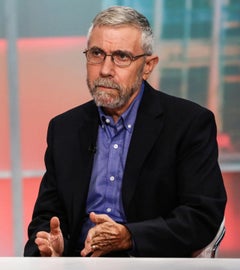MI SELECCIÓN DE NOTICIAS
Noticias personalizadas, de acuerdo a sus temas de interés

On one side you have the Very Serious People - the politicians, media figures and big business types who like to weigh in on public affairs. On the other side, you have mainstream economists. So it’s V.S.P.s versus M.S.E.s.
When talking about “received wisdom” in a recent blog post (available here: bit.ly/1bveDF1), Mr. Wren-Lewis focuses on the views of policy departments at central banks. I’d like to cast the net a bit wider, which means that we have to decide what “mainstream” means. I don’t think I want to base this definition on journal publications; what I mean by M.S.E.s, more vaguely, are the economists who routinely weigh in on policy issues (so that they have some sense of reality), but who aren’t essentially hired advocates for one position or another. Luckily, we now have regular surveys of economists who fit that description, both by the Booth School of Business in the United States and the Center for Macroeconomics in Britain.
Now, many people imagine that the views of V.S.P.s must be based on, or at least consistent with, what M.S.E.s are saying. Many people I talk to relieve this, for better or worse. They think that an obsession with debt and deficits must be right because “everyone” shares it, or, alternatively, that the economics profession is responsible for this destructive obsession.
But it’s important to understand that these views are not at all right. On questions of stimulus and austerity, in particular, what the V.S.P.s think that they know is quite at odds with mainstream economics. In the United States, all the important people know that the Obama stimulus failed, while almost all mainstream economists believe - based on actual evidence - that it succeeded. In Britain, all the important people know that austerity boosted the economy, while only a small minority of mainstream economists agrees.
Needless to say, mainstream economists could be wrong. They certainly have been wrong in the past - very few, for example, took seriously the possibility of financial panic in the modern world. But on the whole, the M.S.E.s have been bastions of good sense these past seven years or so as compared with the political world, and understandably so. While heterodox economic ideas do sometimes turn out to be right, finance ministers are the last group of people you want picking and choosing which new working paper should be the basis of policy.
So by all means, let’s keep an open mind about new ideas. But we should bear in mind that the world would be in much better shape right now if economic orthodoxy had been followed.